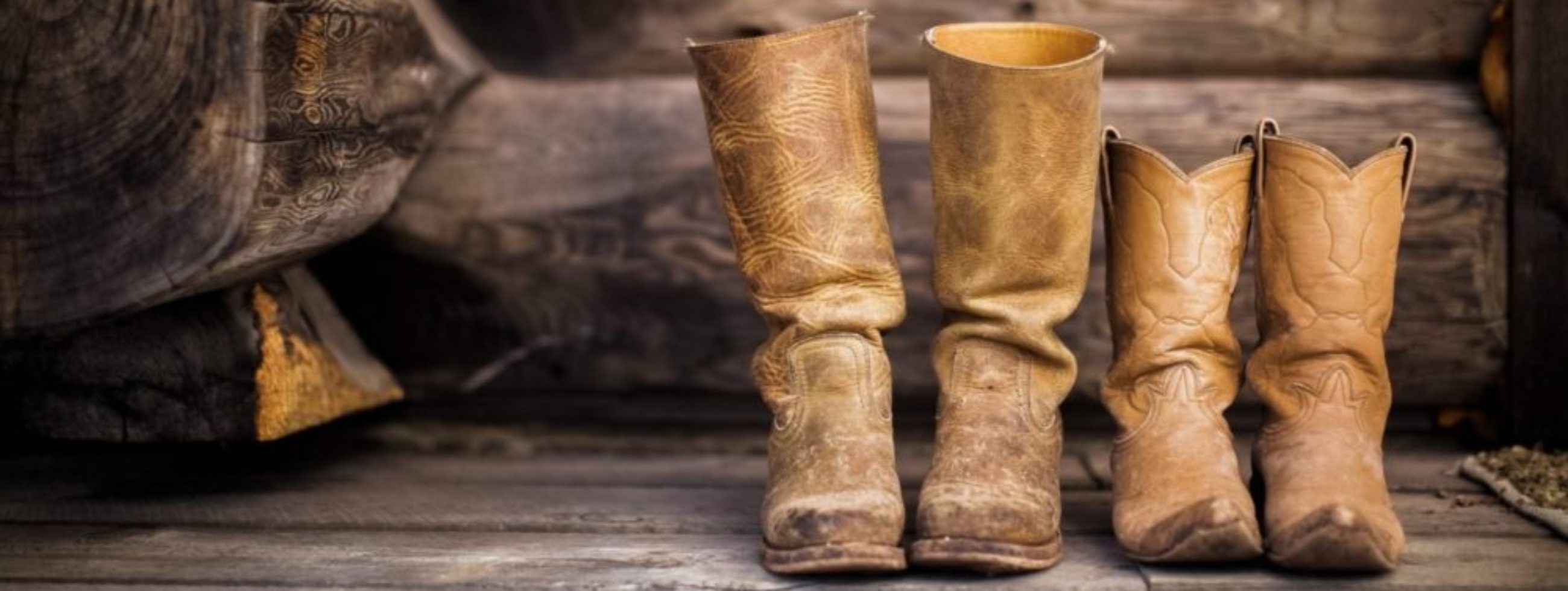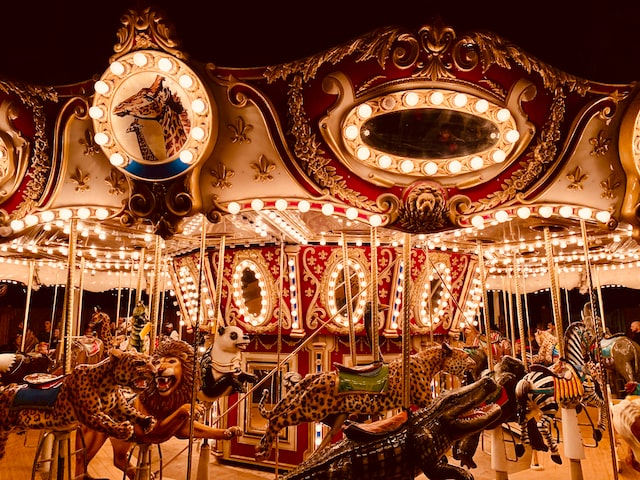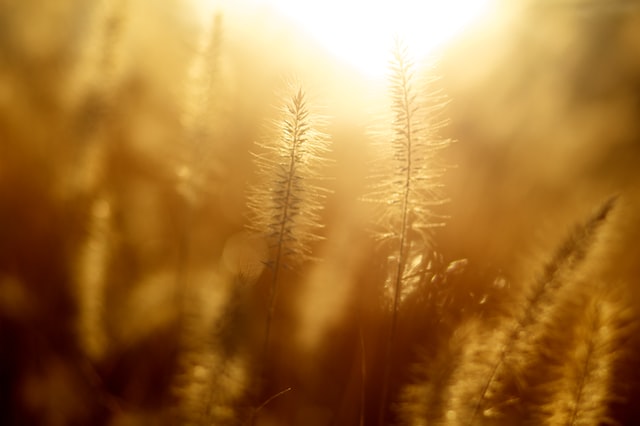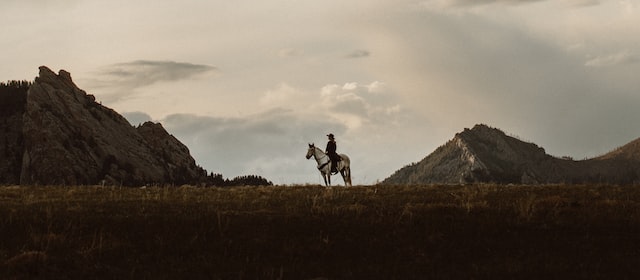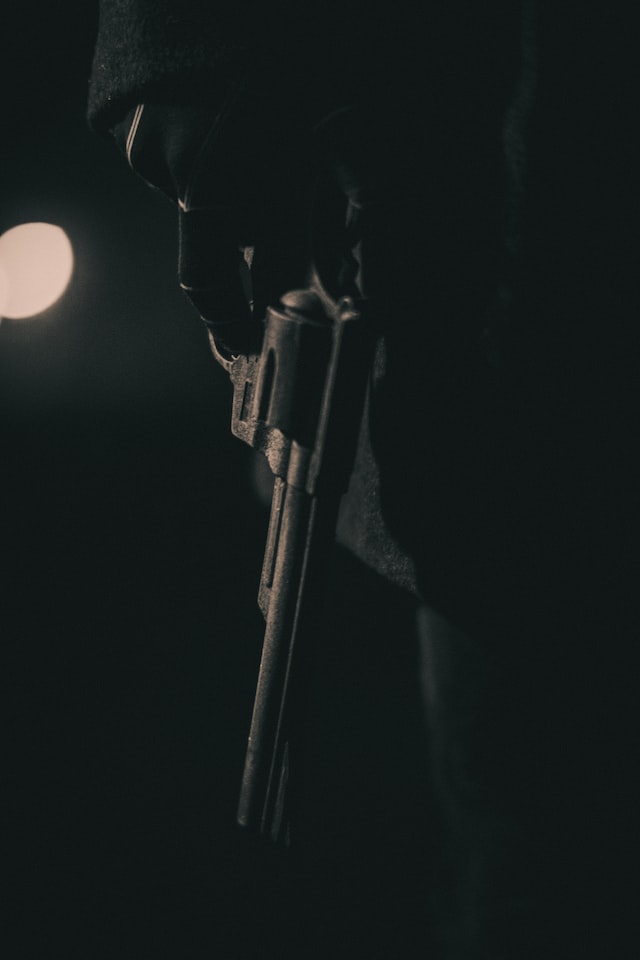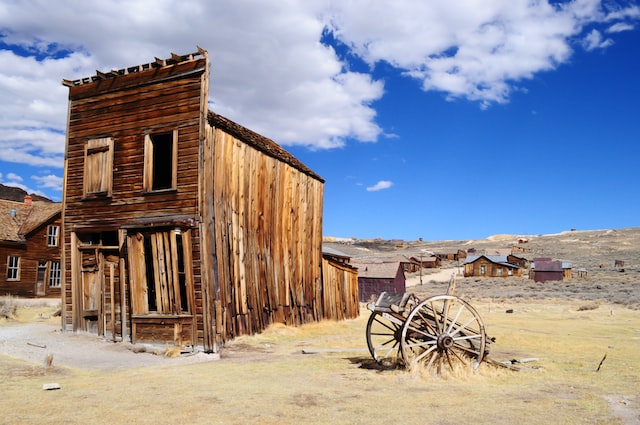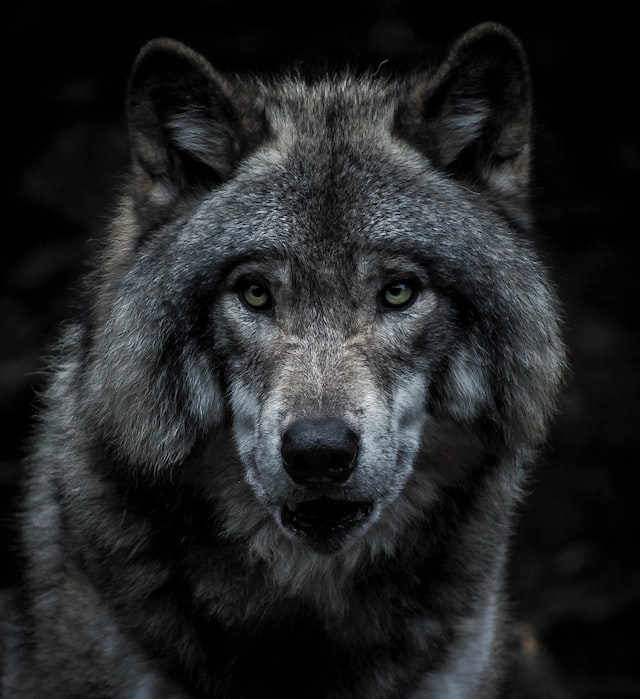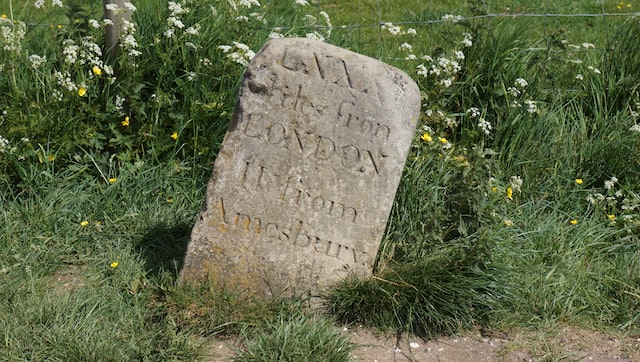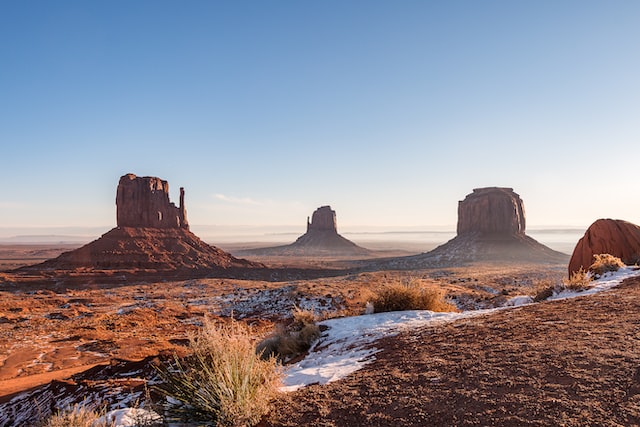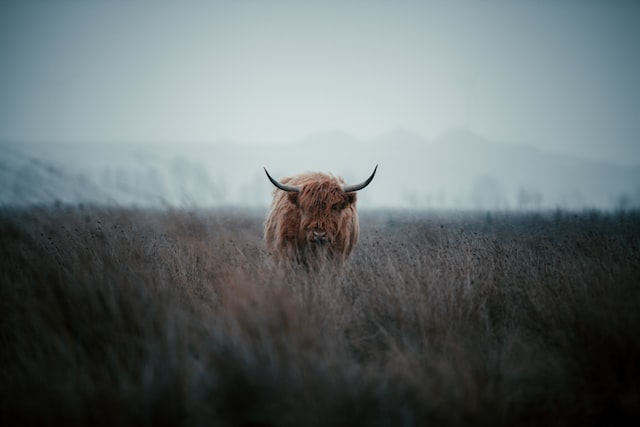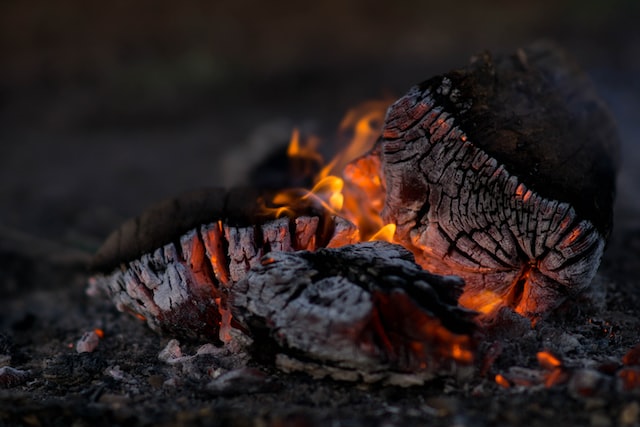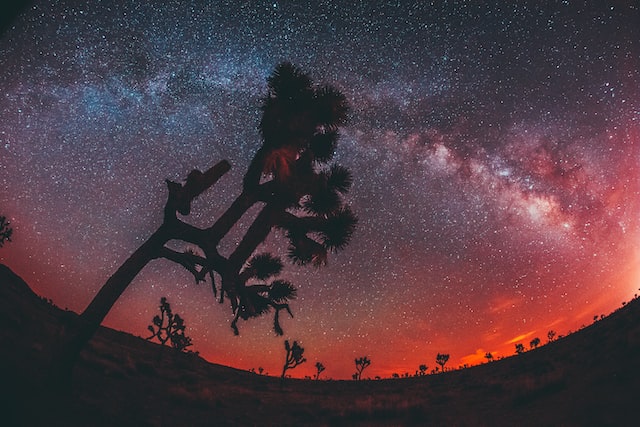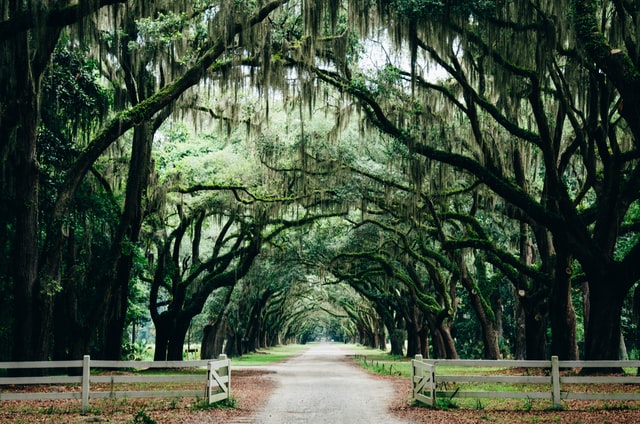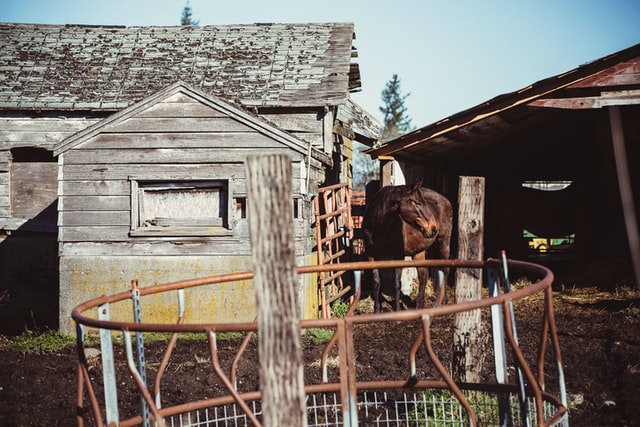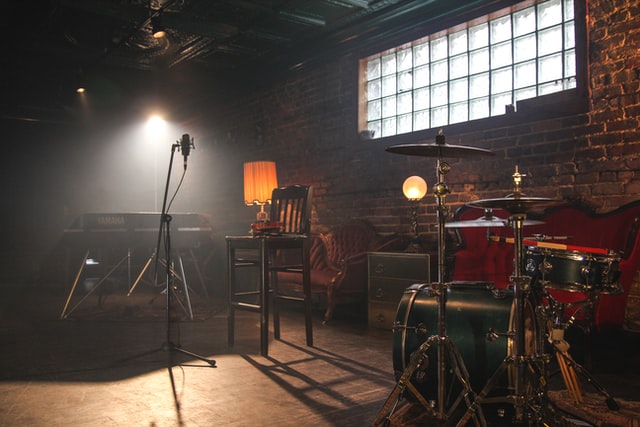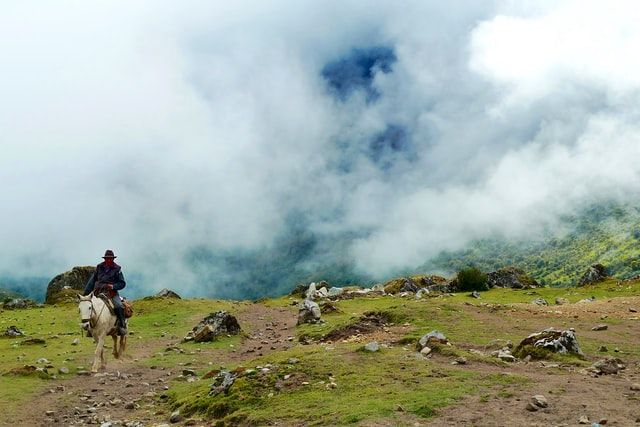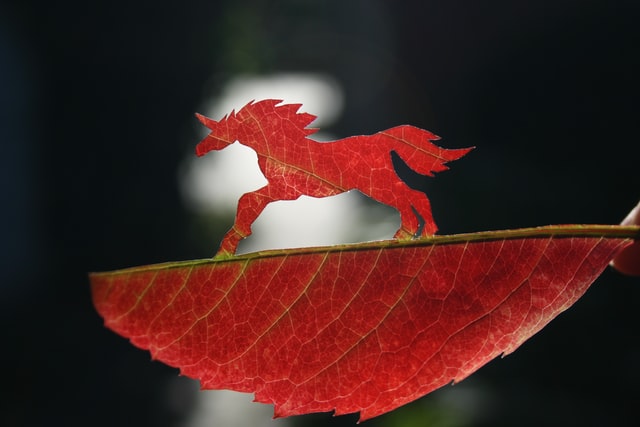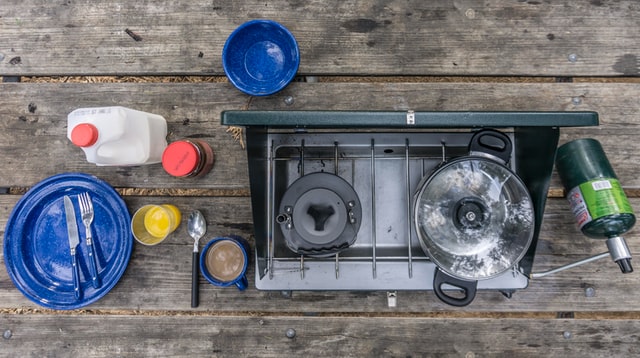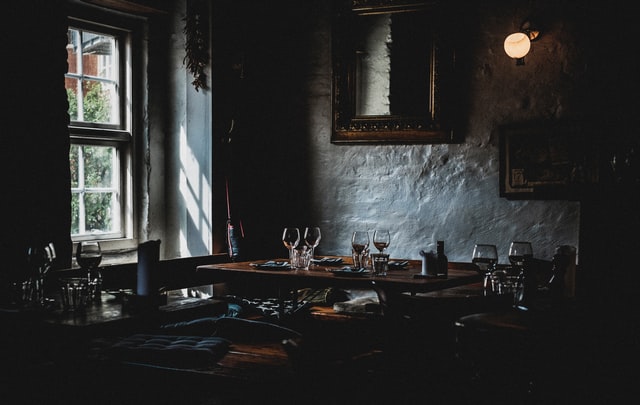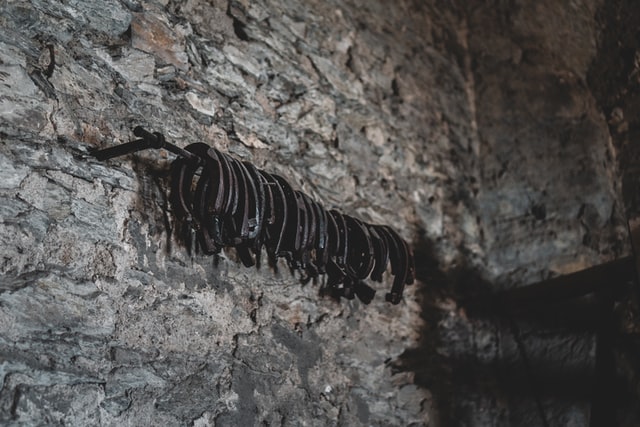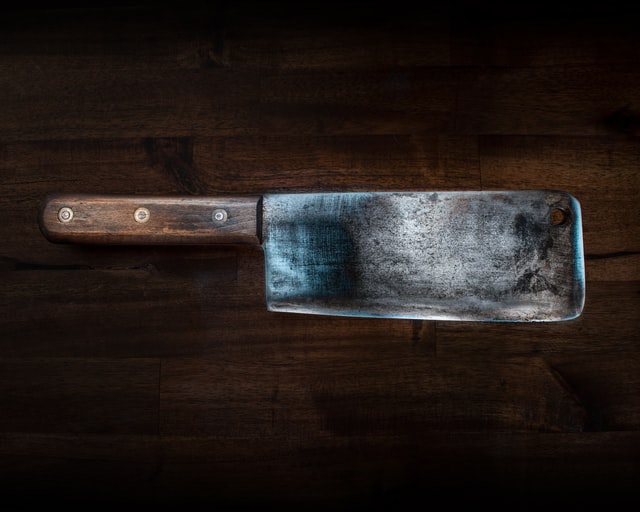Jabbing the posthole diggers into the ground, I pull the sandy soil from the earth. Digging post holes all day isn’t exactly my idea of fun, but I guess that’s what I get for working on the A- Ranch. It is one of the bigger ranches in the Sandhills, and everyone knows the A- brand. While I’m digging from dawn until dusk, my boss gets to ride around on his white stallion and ‘oversee’ everything. He then goes home to his lovely wife and feasts on chicken pot pie or meatloaf, and what do I get? Bologna and wonder bread. Pathetic. I work for Mark and Ellie Anderson; they hired me after high school because my pa died of cancer, and I had nowhere else to go.
“Calvin, get back to work, you’ve been starin’ at the horizon way too long,” Mark says, slinging out his pliers to tighten the wire on a post I thought that I had finished. I allow my eyes to growl at him, and I pluck my fingers into the finely ground tobacco and pack my bottom lip with a dip. The clouds begin to roll over the hills from the east, casting shade on our sweaty bodies.
*******
The fall wasn’t a bad one, except that President Kennedy was assassinated. Ellie cried for an entire week. Before we knew it, we had our first snowstorm, and then the next couple. I live in the Bunkhouse, and it isn’t properly insulated. I have a feeling that mold is growing in the ceiling, and I hear the mice scampering between the walls. I had spent Christmas day with my mom, and with a pickup filled to the brim of leftovers, I came back so I can be ready to feed the cows the next day.
“How is Charlene?” Mark insists that I share a meal with him and his family every so often.
“Mom’s getting along alright; she is still stationed at the post office.” I shift in my seat, hoping that the casual questions would end soon. Snow whirls in currents outside of the window, warning me of heavy snowfall for the night.
After a few more minutes of talking, I slip on my muck boots to bear the cold. I begin the four-hundred-meter jaunt back to the bunkhouse. Snow layers the land, outlining the hills and the trees. I wonder what the Kennedys are doing for Christmas. How can a man feel so inclined to murder? Granted, I lose my temper, but that is only when people or cows are being stupid. My reverie dissipates as a flash of black pierces my eyes. There is something about six hundred meters away in the calving lot next to my house. Mark’s Angus cows are still in the Rosebud pasture, there is no reason why a cow should be this close to the house.
The black smudge moves faster than the normal speed of a pregnant cow trudging through the snow. Loping a few meters forward, it jumps over the fence into the tree line. Picking up speed, I stomp faster to inspect the fence for broken barbed wire. Even though it is below freezing, sweat begins to bundle under the wild rag on my neck. Not a single wire on the fence is snapped, nor fence post crushed. Highly unusual when a cow jumps the fence. I’ll tell Mark in the morning that a cow must be loose.
*******
Mark and I saddle up and ride around the tree line looking for the possible lost cow. He is just as puzzled as I am.
“Are you sure you saw a cow? Maybe you have floaters in your vision.”
“I’m 22 years old, I don’t think I have that.”
“Well, I’ll ride through the rest of the herd just in case to see if a cow is missing.”
As Mark lopes his horse into the western hills, I decide to go clean up the tack in the horse barn. I pour my horse Big Red some oats in the feeding trough inside the barn. I grab the saddle oil to see if I can rub the squeak out of my fender. Every time I get into a trot on Big Red, it sounds like a little mouse is yelping with every step. It nearly drives me mad.
Glancing out of the barn window, I notice that Mark trotting up to the barn. He hops off his horse and pokes his head through the open door.
“There’s no missing cow, thank God.”
“Maybe I was just tired or something, or maybe-”
“Either way, once you’re done taking care of the tack, clean all of the horse crap out of here, okay?” Mark flashes a smile under his burly mustache.After oiling my own saddle, I oil Ellie’s saddle. The dust swirls around me in the barn, configured by the light streaming through the window. The smell of must and sweaty horse lingers. Clean the horse crap. I trudge to get the shovel.
Out of the window, the rotor is standing still on the windmill- no wind today. The sun is blaring, reflecting off the snow to create an extreme level of brightness, compared to the dim barn. Then I see it again. Standing near the base of the windmill is the black smudge. Taking a few steps toward the window, I try to decipher the shape of a black object. It is the same size as a cow, but it doesn’t have short hair like our Angus cows do. It has long matted fur. And a muzzle. It’s a black wolf!
Hidden in the belly of the barn, I know that the wolf cannot see me.I open a cabinet to see if Mark left his rifle. Nothing. I step out of the barn and sprint toward Mark’s house. My heart is pounding as fast as a rabbit- a helpless little prey. I turn my head to see if the wolf is chasing me. It is closer now, but it is sitting in the snow. Its bright orange eyes are on me, looking me over. Facing the wolf, I notice that he is baring his teeth. He opens his mouth as if he is going to howl to alert his pack of fresh meat. Instead, he lets out a laugh. Not a howl that sounds like a laugh, but a chuckle.
I stumble down onto the sandy snowy ground. The wolf keeps laughing at me. Wave after wave of his billowy cackle pierces my ears. I run back to Mark’s house. I don’t look back. My lungs burn like fire as I lumber onto the front porch.
“Good Heavens Cal!” Ellie exclaims. I hear the click of Mark’s lazyboy as he stomps into the front porch.
“You drunk kid?”
“I saw…” I take a moment to catch my breath. I can feel my hair matted to my scalp from sweat. “I saw a black wolf.”
Mark raises his eyebrows. “There aren’t any wolves in the Sandhills.”
“No, I saw it. And it was as big as a cow.” Ellie shoots a worried glance at Mark.
“Look out the window, it’s right over by the windmill!”
“I don’t see no dang wolf,” Mark takes a sharp exhale. “Tell you what Calvin, you have been working hard, and I think that you should take the rest of the day off.”
“I swear I saw it.”
“Why don’t you walk down to the bunkhouse and have an early supper and go to bed.”
“It was right there, I’m not crazy.” I feel a bead of sweat running down my face.
“I think that the stress of the job and the fumes of the saddle oil might be getting to your head.”
“I know what I saw, I heard it laugh.” At that moment I notice that my head is banging as if a migraine is coming on. “My head does kind of hurt.”
Their house smells of beef stew. Once again, I would be eating bologna. I walk back to the Bunkhouse, checking over my shoulder every so often. I go right to bed, at 5:00 p.m. with no supper. Perhaps I did inhale too many fumes.
*******
Months have passed since hallucinating the wolf. Mark and Ellie didn’t feel like mentioning it, trying to shield me from the obvious embarrassment I had been to myself. We moved the pregnant momma cows into the lot next to my house so that we can keep a close eye on them when they begin to calve. Every time I visit my mom for an occasional dinner, she always mentions how I have lost weight. She is hypersensitive to that sort of stuff because my dad lost a lot of weight when he was sick.
Snow still blankets the ground, and the chill has been biting my skin. Frost lays thick on the ponds, and I feel like the sun rarely comes out from his hiding place behind the clouds. President Johnson established the Warren Commission to investigate the death of JFK. All I know is that the guy who killed JFK was killed a couple of days later by some nightclub owner. I think that it is karma because Oswald had it coming, but Ellie always says how sometimes things just happen because we live in a fallen world. That is always her answer for all bad things. If someone dies, that is because sin entered the world, and a consequence of sin is death. Ellie and Mark always go to St. Joseph’s, but I don’t go anywhere anymore. I haven’t really been to a service since dad’s funeral.
Mark and his family are in the big city today for some doctor appointments. He made it very clear that he expects the calving barn to be well-cleaned by the time he gets back. Scrape the old frozen afterbirth off the ground, spread new straw, scoop the cow crap, and sprinkle calcium carbonate to trap the odors and germs. The calving barn I am cleaning up is big enough to hold around fifteen cows and their newborns, so the task is going to take me all morning.
A grumble in my stomach erupts about two hours into the job. I guess that is what I get for skipping breakfast because I slept in. I try to spread the new straw quicker to see if time will move faster, but the dull pain is still present within me.
“Hunger shouldn’t be ignored.” My heart jumps into my throat as I spin around to see where the voice is coming from. Sitting in the far corner pin of the calving barn is the wolf I saw months earlier. His paws are about the size of my face, and I can see steam rolling off his burly body.
“What are… how did…”
“If I were you, I would go and find some food. There is no use working on an empty stomach.”
Without even thinking I respond, “Mark expects this to be finished by the time he gets back.” The wolf closes his eyes and emits a low growl. His ears twitch slightly.
“Mark wants you to work here in the cold while he eats at a nice restaurant. That doesn’t sound fair to me.” The wolf flings his eyes open, exposing his burning orange eyes. His pupils dilate as he focuses on me.
“What are you even?” My stomach turns.
“I am what you think I am.”
Silence settles in the barn as I stare at the wolf, watching the black fur on his chest rise and soften. “Well, I’m not sure what I should think. My boss thinks that I may be losing it, or that my eyesight is bad.”
“It doesn’t matter what he thinks. What matters is what you think. You should think to eat some breakfast.” The wolf flashes a smile; his sharp teeth are as white as the snow outside. Numbly, I walk out of the barn and head to my house. I do not check to see if the wolf is following me. I enter the bunkhouse and take off my boots. What if I am actually seeing the wolf? As I make myself a sandwich and open a bag of Doritos, I deliberately decide not to tell Mark or Ellie. They wouldn’t get it. No one will be able to get it except me, because I am the only one who can see the wolf. When Mark and Ellie arrive back at the ranch later that day, I feel a sense of pride as I keep my secret from them. They would never get it, but I do.
*******
As soon as the first calf dropped onto the ground, the intense season of calving began. The investigation of JFK’s death still treks on, and I wonder how Jackie and her family have been handling his absence. So far, we have fifty calves, with only three deaths. Not too shabby. We still have hundreds of cows left to calve. Mark and I both have been losing sleep. We check the cows through the night and still get up early in the morning to feed the cows. I usually take the midnight and 2 a.m. shift, and Mark usually checks them at 10 pm and 4 a.m. The wolf never hurts our livestock. He’s not like other wolves. When I check the cows, sometimes the wolf joins me. We talk about what it is like to live alone. He is a lone wolf, and I am by myself most of the day. Unlike my mom or Mark, he listens to me as I talk. He understands me, and he says that he will only appear to me because I deserve it more than others. He says that the nights are bitingly cold and that he wishes he had a place to rest.
As I slip on my overalls and muck boots, I think about the conversation I had with the wolf the night prior. He told me that I should be in charge of the A- ranch because I do more work than Mark. I somewhat agree, even though I know that this ranch has been in Mark’s family for generations. Mark used to run it with his two brothers after his dad died, and he grew up in the same house he lives in now. The wolf insists. I am starting to trust the wolf more and more.
During the dark hours of the night, the wolf has been there to be my companion. I always look forward to talking with him, even though guilt bubbles up in my consciousness about keeping secrets from Mark and Ellie. I open my front door and stomp through the snow to the preheating feed pickup. I loaded it up with cake yesterday, so now I just need to feed the brown pellets to the cows. There are no clouds in the crystalized blue sky, and the warm sun gives me a smidge of hope for the coming spring. I drive past Mark on his horse, and he waves me down to talk to him.
“Two calves, Calvin. Two calves died last night. Didn’t you check them?” Mark isn’t shouting, but I can hear the disappointment in his tone.
“I swear I checked them!”
“Well if you would have checked them, you would have realized that there were wet newborn calves on the frozen ground. You would have had the right mind to put them in the calving barn with their mommas to warm up.”
“Didn’t you hear me! I said I checked them. If anything, it’s probably your mistake.” I surprise myself by yelling at Mark.
“Listen, Calvin, just try to do better. I know things have been a little rough for you lately, especially because this time four years ago, you know…” Mark is no longer frowning, instead, his blue eyes have a shade of worry to them.
“You don’t know anything.” Without saying goodbye, I drive away. I see Mark in my review window, fiddling with his reins. What does he know, that my dad died four years ago? That doesn’t mean that he understands anything. I drive the feeding pickup over to our first group of cows and feed them. I watch their udders swing back and forth as they jog towards the feeding pickup, knowing that there will be a promise of cake to nourish their bodies. I switch a toggle shift, allowing the cake to funnel out of the feeder, onto the ground. Cows swarm around the cake as maggots do on a piece of rotting flesh. I guess everything must be fed somehow.
After feeding that bunch of cows, I move on to the next bunch. As I drive to the next pasture, I feel a tug on the steering wheel, as the pickup slides off the road into the muddy ditch. I press the gas pedal to the floor, but the pickup does not budge.I press on the gas pedal again, and I hear the tires dig themselves deeper into the slush. The once beautiful sunlight seems blinding as I hop out of the pickup to inspect how badly I am stuck.
“Damnit!” I yell at the pickup, but mostly at myself for messing up, once again.
“I see that you have found yourself in a rough spot.” Feeling hot breath on my neck, I spin around and find myself face to face with the wolf.
“Will you help me get out? Surely you are strong enough to push me out, please.”
“You ask a grandiose thing of me. What do I ever ask of you?” The wolf questions in a low whisper. I gaze into his bright orange eyes, hoping to find a hint of sympathy, but they are placid. The orangeness of them reminds me of a hunter in the woods. I reflect on the feeling I had once in the wolf’s presence. One of a rabbit.
“You ask nothing of me. But I could really use your help right now. Mark is already pissed at me.” My mouth has become dry, and my tongue feels like sandpaper.
“If I do this for you, I will have to ask one thing of you.” The wolf wears a smile.
“I’ll do anything you ask. Please just help me out!” I reach out my hand to touch his thick fur, but I stop myself, for I realize I have never touched the wolf’s coat before. I don’t want to anger him in this moment of helplessness.
“I will help you out. All I ask is that you leave your front door open during the night. Do not close it, do not lock it, just leave it cracked open so I can slip in.”
“It’s going to be below freezing tonight, the cold will get in.”
“The cold doesn’t matter. How do you think I feel sleeping out in the cold, night after night? Have you ever broadened your mind to think about how I must feel?”
“I didn’t realize. I guess I could just bundle up. Fine. I will do it, just please help me now.” The wolf motions for me to get back into the pickup. I stick my head out of the window. He lifts himself up, so he is standing on his two back paws. He is about twelve feet tall standing upright. Bigger than any horse I had ever ridden. If I hadn’t had a personal relationship with him, I would probably find myself a little frightened. He places his paws on the back of my pickup, and he yells at me to press on the gas. The growl of the motor is weak compared to the amplitude of the growl coming from the wolf. I realize that the pickup is inching out of the ditch. Looking back at him, I notice that his large eyes are shut as he strains to push the pickup out of the muck. Inch by inch, the pickup works its way back onto the road. That’s a relief, now Mark won’t have another reason to yell at me. I hop out of the pickup onto the frozen ground.
“Thank you, wolf.”
“Don’t forget your promise, I know I won’t. I will see you tonight.” The wolf nods his head and bounds off, back to the tree line. He disappears from my sight, but I know that he won’t be far.
I feed the next few bunches of cows with ease. I wonder how long the wolf will stay during the night. Should I lay a blanket out for him in case he wants to sleep; I don’t even know if he would want a blanket. I don’t want to make a fool of myself. Should I tidy up my house? What about the mold in my ceiling? My brain continues to run with ideas of how to make the wolf feel welcome in my home while I pull up to the horse barn. As I pour a bucket of cake into the horses’ feeding trough outside, I don’t realize Mark and Ellie walk up behind me.
“Hey Calvin, how’s it going?” Ellie says. I know that she is smiling because she is trying to appear caring.
“Good.” I smooth out the cake into an even layer in the feeding trough. I notice Big Red and the other horses slowly approaching.
“Mark told me that you seemed a little stressed out this morning, are you sure you are okay?” Ellie asks. The sun flashes off her dangling Crucifix necklaces into my eyes. I know that Ellie is going to give me her usual lecture on how I should have hope in the Lord and that everything will get better. She will offer to drive me to town to see my mom. By saying those words though, she never makes me feel better, in fact, they just make me kind of mad.
“I’m fine. Didn’t you hear me the first time, woman?”
“Don’t you talk to her that way. All she is trying to do is help you.” Mark says. The blood veins in his forehead are popping out in the same way they do when he gets fired up while working cattle.
“You guys can help me by leaving me alone.” I flash a smile at them, but not because I am happy. Because I am right. Mark wraps his arm around Ellie as he shoots me a glare. They walk away, leaving me to do my chores. There is no doubt that Ellie is going to go phone my mother, but I didn’t care. A new kind of fire is pummeling through my veins. Before I knew the wolf, I would have never been able to stand up to my boss. Now I can do it with ease.
*******
As the sun goes down, I remember the promise I made with the wolf. Actually, I haven’t been able to get the thought out of my mind all day. I pick up some dirty laundry off my floor, and I wash all of the dirty dishes. I put on multiple layers and even my coat. Setting a stone in front of the screen door, I prop it open, just as the wolf instructed me to do. Sitting down on the living room couch, I await the arrival of the wolf. It is about nine, and I know that I will have to check the cows at midnight. Perhaps the wolf would like to come with me. The cold pricks my skin, but I clench my teeth and bear it.
*******
I wake up still on the couch. I didn’t mean to fall asleep; I glance at the clock. 11:30. A low growl startles me as I jolt upright. Combing the room, I notice that the huge black mass of the wolf is settled in the corner of the room.
“Sorry, I didn’t mean to fall asleep. You see I left the door open?” I point towards the front door, hoping to receive praise. The wolf just stares at me; his eyes seem to no longer be a bright orange, but rather, as red as an open wound.
“Did you want me to set a blanket out or anything? You can even sleep in my room if you want, I can stay sleeping on the couch.” I stammer, looking for the right words. “I have some cuts of meat in the freezer if you want any. I have pork and beef.”
“Indeed. There is something I want.” The wolf answers in a grating voice. His presence looms over me, making my insides squirm. “I want you. And I already have you. I found you alone. You trusted me and followed me as a moth does to fluorescent light.”
“What? I don’t quite understand.” My heart drops to my ankles. The wolf rises to all fours and takes a step toward me. “But you helped me, and you listened to me. And I left the door open to my house.”
“You are all alone. Mark and Ellie tried to help you, all in vain. Your mother would be disappointed in you. You cannot escape.” I fall to my knees. A few tears spill from my eyes onto the dirty shag carpet. The wolf carefully moves closer to me.
“What are you?”
“I am what you think I am. And you thought wrong. Few people ever find out.”
“I don’t… What do you want from me?”
“I want you.”
“Please just stop. Stop! Leave me alone.” Tears keep rolling from my eyes, and my heart is pounding once again, like a rabbit.
“But you see, hunger is not a thing that should be ignored. It should be tended to.” With the stench of death fuming from his mouth, the wolf exhibits his sharp teeth. The wolf pounces, landing atop me.
*******
At four a.m. Mark wakes up to check the cows. A couple of cows look like they are ready to calve. Walking past Calvin’s house, he realizes that the front door is propped open. Mark decides to investigate the house. Stepping into the house, Mark first realizes the metal smell lingering in the air. The house is as cold as it is outside, and as Mark walks into the living room he finds Calvin. A mass pile of blood has frozen to the shag carpet, and Calvin has huge gaping holes in his neck.
“My dear Jesus, how could this happen?” Mark squats down to feel Calvin’s skin, and it is as cold as snow. Mark sprints back to his house and calls 911, but how can he exactly explain what he saw? There is no knife or gun around Calvin’s body. The holes looked like were bite marks from that of a predator. Mark recalls months ago when Calvin came into his house disheveled, exclaiming that he had seen a wolf. Mark holds Ellie close to him as he cries into her hair. Ellie wraps her arms around him, holding him in an embrace.
Grace Vinton grew up on a cattle ranch in the Sandhills of Nebraska. She is currently pursuing her Secondary English Education and Creative Writing minor at the University of Nebraska in Kearney. She loves writing, riding horses, and the Sandhills.
